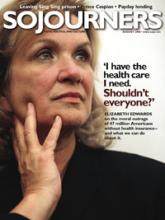Healing is both a major subject of faith and now a global crisis with the breakdown of public health-care systems and the breakout of pandemic diseases. Megachurch pastors hold conferences on HIV/AIDS and malaria, while faith-based organizations are often in the forefront of responding to the world’s most lethal diseases. The grotesquely unequal access to lifesaving drugs and medical care has made death a social disease.
To guide our search for more humane and effective health care, we will need to establish some principles: for example, that health care should be a human right and not a commodity for sale, and that wealth should not determine one’s share of health in our world. We need to build consensus on principles and priorities if we are to address successfully the enormous challenges of public health in a world of massive inequalities. And until something is done to make universal health care a reality in America, millions of families will remain poor.
A few months ago, I had a personal experience that brought it all home. My wife, Joy, and I woke up early one morning to the sounds of our screaming 4-year-old, Jack, who was suffering from extreme abdominal pain. We tried to console and cuddle him, but to no avail. “Don’t touch me, it really hurts!” he cried when we tried to examine his sore tummy. This was not like him at all; he is not an overreactive kid.
Read the Full Article
